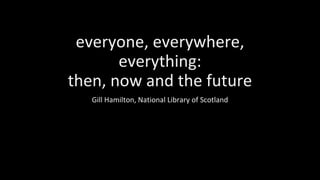Everyone, everywhere, everything : then, now and the future / Gill Hamilton, National Library of Scotland
- 1. everyone, everywhere, everything: then, now and the future Gill Hamilton, National Library of Scotland
- 2. overview - how far weĪ»ve come - current problems in provisioning (meta)data - and maybe some solutions? - current problems in information seeking - and maybe some solutions?
- 3. look how far weĪ»ve come
- 10. your place in RD?
- 11. 00001604cam a2200421 i 4500 0015724666 00520160518113051.0 006m d f 007cr| nn||||||||| 008150218s2015 stka sb f000 0 eng d 020__ |a 9781785440755 (web only) 040__ |a StEdNL |b eng |e rda |c StEdNL 1001_ |a Wilson, Michael |c (Social scientist), |e author. 24514 |a The Scottish health survey : |b mental health and wellbeing / |c authors - Michael Wilson, Craig Kellock, Daniel Adams, Julie Landsberg. 24630 |a Mental health and wellbeing 264_1 |a Edinburgh : |b Scottish Government, |c 2015. 300__ |a 1 online resource (76 pages) : |b illustrations (colour) 336__ |a text |2 rdacontent 337__ |a computer |2 rdamedia 338__ |a online resource |2 rdacarrier 347__ |a text file |b PDF |2 rda 500__ |a Title from PDF cover. 500__ |a "Topic report."
- 12. Insert image of cataloguer
- 13. but you need help
- 14. but you need help
- 15. and still thereĪ»s more!
- 19. Hey Caty IĪ»m listening Gill New printed book Printed book template ready Title Awaiting title Managing workplace chaos Got it! Look OK? Yes. Next Subtitle Awaiting subtitle Solutions ĪŁ. Got it. Look OK?
- 20. 11
- 23. Measuring the effects of Coulomb repulsion via signal decay in an atmospheric pressure laser ionization ion mobility spectrometer by G Hamilton, P Cunnea, A Smith, E Smith LCNAF
- 24. uniforms hats women smiling hand bag WomenĪ»s Auxiliary Army Corps building
- 29. and they need help
- 31. Scottish health
- 36. repurposing search and usage data?
- 37. everyone can help with everything everywhere
- 38. thank you!
Editor's Notes
- #15: https://www.lecourrierderussie.com/opinions/2018/01/administration-entree-labyrinthe/
- #28: So thatĪ»s on end of the resource discovery spectrum, those of us who prepare the data, but at the other end of the spectrum are our users
- #29: Our users are like cataloguers dealing with huge amounts of data and information too. Extraordinary access compared to the beginning of my career when you basically had to go inside the Library and truly you only had access to what was there. Everything else was via inter library loan or convincing the subject librarian to do a very expensieve online search. Now information is everywhere and right here in our users hands on their mobile phones. Truly weĪ»re coming to a place where everyone can access everything anywhere and everywhere. And no doubt our users are grateful for the careful curation and description that we do as cataloguers and librarians. But we know that their information landscape is wider than the collections of the Library. They may search the catalogues of their local university library, and perhaps next attempt to search the catalogue of the French National Library on a similar topic, then look at the blog of a fellow researcher in her field, then check to see if her bus is delayed, and what the weather is going to be when she realises sheĪ»ll have to walk home. A research my be interested in the carefully curated collection of the BnF too, and that the blog of her research colleague over at that Uni, and what the when the train is going home, and the latest kitten image from her facebook feed. They have extraordinary access to information, and they have to look in many places to do that






































